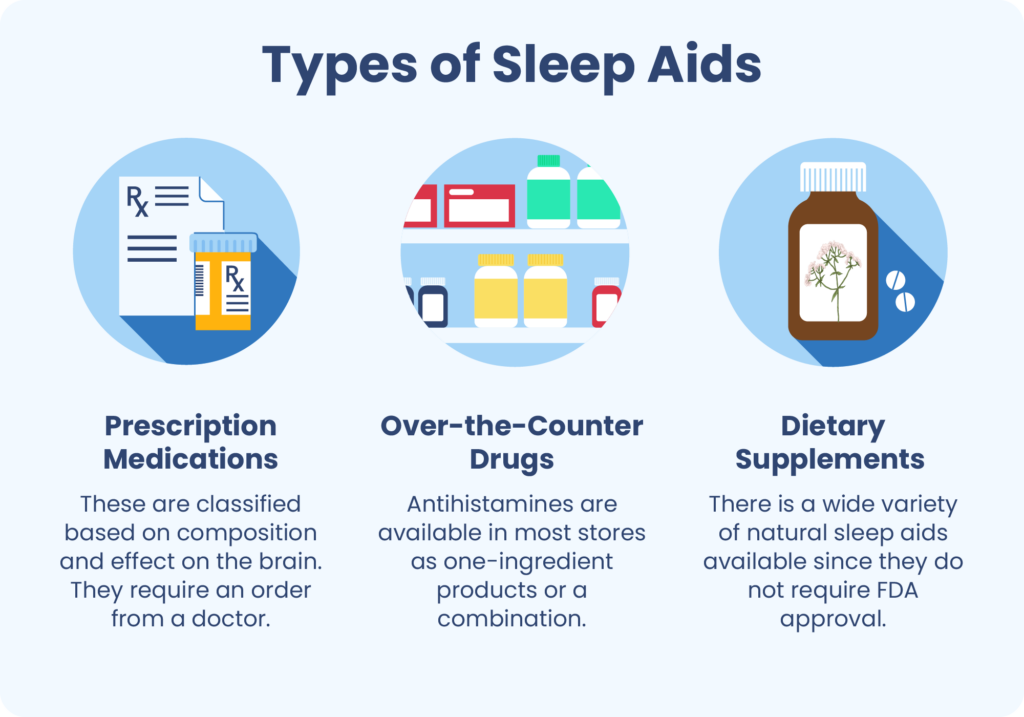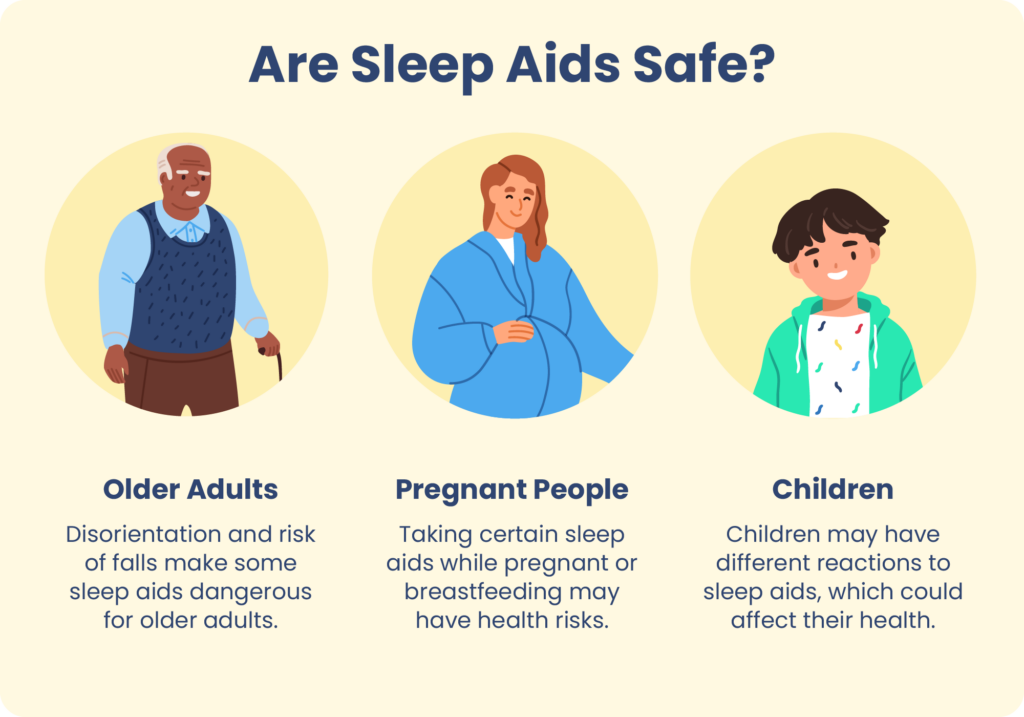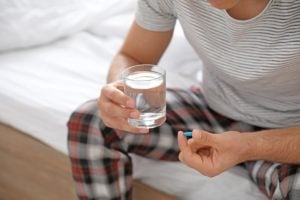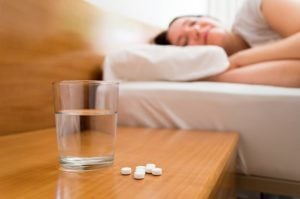When you buy through our links, we may earn a commission. Products or services may be offered by an affiliated entity. Learn more.
Sleep Aids: Know the Types, Benefits, & Risks
- The best sleep aid depends on the cause of your sleep issues and any health conditions you may have.
- Over-the-counter sleep aids are typically antihistamines that have a sedative effect.
- Natural remedies, like diet and lifestyle changes, can promote better sleep and overall health.
- Talk to your doctor before taking a sleep aid and discuss any side effects concerning you.
Sleep problems are commonplace. In addition to disrupting sleep at night, these issues can have lasting effects on day-to-day life. To address sleep issues like insomnia, many people turn to sleep aids. These include prescription drugs, over-the-counter medications, and dietary supplements.
Every sleep aid has potential benefits and downsides, and it is important for individuals to be informed about their treatment options and talk with a doctor about the best option in their personal situation.
How Commonly Are Sleep Aids Used?
Sleeping pills or other sleep aids are commonly used to treat insomnia and occasional sleeplessness. Studies have found consistently rising rates of sleep aid use, with one study showing that around 3% of adults had used a prescription sleep medication in the month prior.
Data from the CDC shows that many adults take sleep aids frequently, with more than 8% of adults using a sleep aid at least four times in the previous week. Use of prescription sleep medications has increased among older adults , including people without a formal diagnosis of insomnia.
This research also reflects a trend toward higher usage of over-the-counter (OTC) sleeping pills as well as dietary supplements.
How Do Sleep Aids Work?
Most sleep aids work because they have a sedative effect, which means that they make you feel sleepy . That sleepiness may happen rapidly to help someone fall asleep, or it can have a prolonged effect to make it easier for them to sleep through the night.
The way that a sleep aid produces a sedative effect varies on its chemical composition. Depending on how they work and how they are regulated, sleeping pills can be organized into several distinct types.
Types of Sleep Aids
There are three types of sleep aids: prescription medications, over-the-counter drugs, and dietary supplements.

Prescription Drugs
Before a prescription drug can be sold, it must be approved by the Food and Drug Administration (FDA), which carefully reviews data from research studies about its effectiveness and safety. Once the drug is approved, doctors can prescribe them to patients.
Different classes of drugs cause sleepiness based on their chemical composition and how they affect the brain.
- Z Drugs: These medications slow down activity in the brain, which prompts a sedative effect.
- Orexin receptor antagonists: These drugs block production of orexin, a chemical in the brain that makes you feel alert.
- Benzodiazepines: Benzodiazepines are like Z drugs in that they decrease brain activity to induce sleepiness. These were among the first prescription drugs to be used for insomnia.
- Melatonin receptor agonists: This type of medication stimulates melatonin receptors in the body, which promotes sleepiness.
- Antidepressants: These drugs were first designed to treat depression but later found to have a sedative effect. Only one antidepressant is formally approved by the FDA for insomnia.
Once a drug has been approved by the FDA for one use, doctors can prescribe it for other conditions, which is known as “off-label” use. Drugs such as antipsychotics and anticonvulsants are occasionally used off-label for sleep problems, but there is less data about their safety and effectiveness in treating these issues.
Over-the-Counter Medications
Over-the-counter (OTC) medications can be purchased without a prescription. These medications do not go through the same level of FDA review as prescription medications, but they still must meet certain regulatory standards before they can be sold.
Over-the-counter sleep aids are typically composed of antihistamines. Antihistamines are frequently used to manage allergies, but because of their sedative effect, they are also marketed as sleeping pills.
Antihistamine sleep aids may be sold as one-ingredient products, or the antihistamine may be combined with active ingredients for other issues such as cough, fever, or congestion.
Dietary Supplements
Although people may use them for health reasons, dietary supplements are not formal medications. They do not have to be approved by the FDA , and there is considerably less oversight of sleep aids sold as dietary supplements.
Natural sleep aids, such as melatonin, valerian, or kava, are examples of dietary supplement sleep aids. Brands can create sleep aids made of just one ingredient or a blend, which is why there is a huge diversity of these sleep aids available on the market. Melatonin in particular is commonly prescribed for jet lag, shift work disorder, and other issues stemming from circadian rhythm misalignment.
Among the types of sleep aids, dietary supplements tend to have the least amount of evidence from studies documenting their benefits and downsides.
Better Sleep Starts Here
Try our proprietary melatonin sleep support formula. It’s research-backed and clinically-studied for easier wind down and improved sleep quality.
Shop NowPotential Benefits of Sleep Aids
The primary benefit of most sleep aids is that they induce drowsiness to help you fall asleep or to increase the likelihood that you will stay asleep through the night.
By improving sleep in the short-term, many sleep aids may help alleviate daytime drowsiness and impaired thinking from sleep deprivation. They may help reset your sleep schedule, enabling you to get more consistent sleep.
That said, most sleep aids are not meant for long-term use. As a result, treatment for sleep disorders like insomnia often combines a sleep aid with practical steps, such as improving sleep hygiene, that can help you get quality sleep every night without relying on sleep medication.
Which Sleep Aids Work the Best?
Not everyone has the same reaction to a sleep aid, so there is no hard-and-fast rule about which one works the best. Instead, doctors suggest treatments based on the patient’s specific situation, including their symptoms and their overall health.
To make these suggestions, doctors may draw on guidance from expert organizations like the American Academy of Sleep Medicine (AASM). The AASM organizes panels of sleep experts who review the existing research and make general recommendations about sleep aids.
In the latest AASM guidelines for sleep aids for insomnia , certain prescription drugs are recommended depending on whether a person’s problem is with falling asleep or sleeping through the night. This is because certain sleep aids work quickly and wear off fast, and others start slowly and last a long time. The AASM recommends against the use of over-the-counter sleeping pills and dietary supplements like melatonin and valerian.
The safety and efficacy of supplements is not closely monitored by the U.S. Food and Drug Administration (FDA). Shoppers should take additional measures to make sure they are purchasing reputable products.
Potential Risks of Sleep Aids
Potential side effects can vary based on the specific sleep aid and whether the person taking it has any other health problems or medications that they take. In general, there are potential negative effects that can occur with almost all sleep medications, although the likelihood of these effects may be higher with some sleep aids.
- Lingering next-day effects: As many as 80% of people taking sleep aids say that the sedative effect may persist after they have woken up, creating excess drowsiness or slowed thinking when a person should be alert. This issue is most worrisome for people who drive in the morning and may be at a higher risk of auto accidents.
- Confusion or loss of coordination: A strong sedative effect can make a person feel confused, dizzy, or unable to concentrate. As a result, they may be at risk for falls or other accidents right before bed or during the night.
- Abnormal behavior: After taking sleep aids, some people engage in strange behavior while remaining partially asleep and unaware of their actions. This behavior can range from simple things like talking, to more complex actions like sleepwalking or trying to drive.
- Allergic reaction: These responses are rare, but some people have allergic reactions to sleep aids.
- Drug interaction: A sleep aid may interact with other medications and potentially change their potency or how they affect the body.
In addition to this general list of potential side effects, there are risks that exist only with some sleep aids. For example, some sleeping pills may have detrimental effects on other health conditions. A number of sleep medications are tied to worsening symptoms of depression, and prescription sedatives can cause suppressed breathing that can exacerbate sleep apnea.
Many sleep aids can be habit-forming. This may lead to the drug being taken for too long or at too high of a dose, increasing the risk of side effects. Abruptly stopping the use of some sleep aids can trigger withdrawal symptoms, which can include trouble falling asleep.
Because of the possibility of side effects, it is important to talk with a doctor before starting to take any sleep aid.
What Are the Safest Sleep Aids?
There is no sleep aid that is universally the safest. Depending on your personal health situation, certain drugs may have more risks than others. But this determination should be made by a health professional who can review your situation and discuss the benefits and risks of specific sleep aids in your unique case.
What’s the Best Sleep Aid?
The best sleep aid is the one that is most tailored to your needs, including the nature of your sleep problems, your age, your overall health, and any other medications that you may take. Taking these factors into account, you and your doctor can compare sleep aids and their potential benefits and downsides.
In some cases, the best way to get better sleep may not involve a sleep aid at all. Non-medical treatments are often effective, and a doctor can review your options for both medical and non-medical treatments and help you decide what’s best given your circumstances. Improved sleep hygiene, including sticking to regular bed and wake times can be an alternative option for some people.
Are Sleep Aids Safe?
Sleep aids are usually considered safe for short-term use as long as they are used as directed. However, given the potential for side effects, it is always safest, regardless of the type of sleep aid, to take it under the guidance of a health care professional.
To reduce the risk of negative effects, it is important to take sleep aids safely. This generally means taking them at the right time and only with the recommended dosage. Extra doses should be avoided, even if sleeping problems continue. In addition, sleep aids should not be mixed with other sedatives, alcohol, or recreational drugs.

For certain people, there may be added risks of taking sleep aids.
- Older adults: Problems of disorientation and risk of falls from sedative medications make some sleep aids dangerous for older adults.
- Children: Even at lower doses, children can have different reactions to drugs than adults and sometimes certain sedatives can have the opposite effect. Given a child’s ongoing physical and mental development, those reactions can be detrimental to their health.
- Pregnant and breastfeeding people: Depending on the sleep aid, there may be health risks when these medications are taken during pregnancy or while breastfeeding.
People in these groups or those who have coexisting health conditions should carefully review their sleep aid options with a doctor to determine whether there is a medication or supplement that is safe for them to take.
Medical Disclaimer: The content on this page should not be taken as medical advice or used as a recommendation for any specific treatment or medication. Always consult your doctor before taking a new medication or changing your current treatment.
References
9 Sources
-
Bertisch, S. M., Herzig, S. J., Winkelman, J. W., & Buettner, C. (2014). National use of prescription medications for insomnia: NHANES 1999-2010. Sleep, 37(2), 343–349.
https://pubmed.ncbi.nlm.nih.gov/24497662/ -
National Center for Health Statistics. (2019, December 13). QuickStats: Percentage of adults aged ≥18 years who took medication to help fall or stay asleep four or more times in the past week, by sex and age group — National Health Interview Survey, United States, 2017–2018. Centers for Disease Control and Prevention., Retrieved April 14, 2022, from
https://www.cdc.gov/mmwr/volumes/68/wr/mm6849a5.htm -
Albrecht, J. S., Wickwire, E. M., Vadlamani, A., Scharf, S. M., & Tom, S. E. (2019). Trends in insomnia diagnosis and treatment among Medicare beneficiaries, 2006-2013. The American Journal of Geriatric Psychiatry: Official Journal of the American Association for Geriatric Psychiatry, 27(3), 301–309.
https://pubmed.ncbi.nlm.nih.gov/30503702/ -
A.D.A.M. Medical Encyclopedia. (2020, April 9). Medicines for sleep. MedlinePlus., Retrieved April 14, 2022, from
https://medlineplus.gov/ency/patientinstructions/000758.htm -
U.S. Food and Drug Administration (FDA). (2017, November 13). Prescription drugs and over-the-counter (OTC) drugs: Questions and answers., Retrieved April 14, 2022, from
https://www.fda.gov/drugs/questions-answers/prescription-drugs-and-over-counter-otc-drugs-questions-and-answers -
National Center for Complementary and Integrative Health. (2018, December). Using dietary supplements wisely., Retrieved April 14, 2022, from
https://www.nccih.nih.gov/health/using-dietary-supplements-wisely -
Sateia, M. J., Buysse, D. J., Krystal, A. D., Neubauer, D. N., & Heald, J. L. (2017). Clinical Practice Guideline for the Pharmacologic Treatment of Chronic Insomnia in Adults: An American Academy of Sleep Medicine Clinical Practice Guideline. Journal of clinical sleep medicine : JCSM : official publication of the American Academy of Sleep Medicine, 13(2), 307–349.
https://pubmed.ncbi.nlm.nih.gov/27998379/ -
Fitzgerald, T., & Vietri, J. (2015). Residual Effects of Sleep Medications Are Commonly Reported and Associated with Impaired Patient-Reported Outcomes among Insomnia Patients in the United States. Sleep disorders, 2015, 607148.
https://pubmed.ncbi.nlm.nih.gov/26783470/ -
Creeley, C. E., & Denton, L. K. (2019). Use of Prescribed Psychotropics during Pregnancy: A Systematic Review of Pregnancy, Neonatal, and Childhood Outcomes. Brain sciences, 9(9), 235.
https://pubmed.ncbi.nlm.nih.gov/31540060/






















